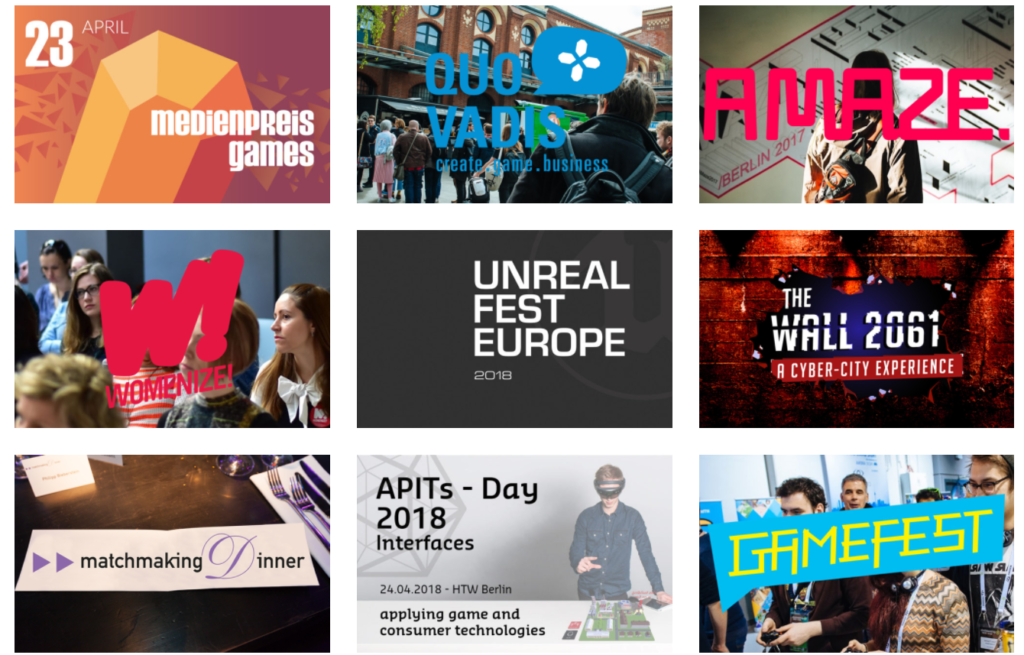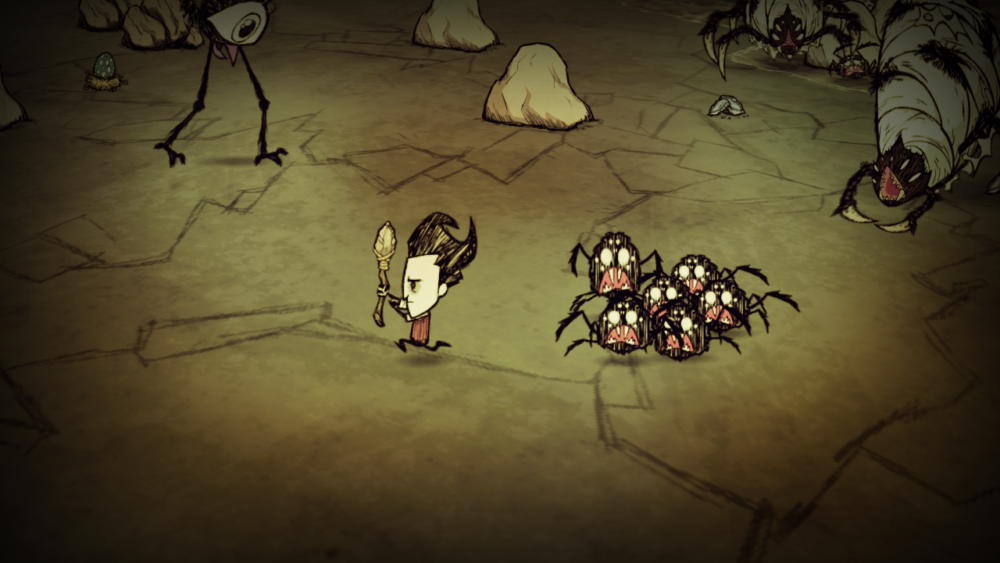Less power for the players can make games better
One of our speakers at the Intel® Buzz Workshop Berlin is Valentina Tamer, a game designer, writer and artist working for game developer Daedalic Entertainment. Her talk approaches Disempowerment Fantasies – a concept we frequently encounter in video games, but rarely even notice. Our Social Media Manager Sandy talked with Valentina Tamer about why turning players into almighty gods isn’t necessarily a powerful game design decision.
 Disempowerment in Don’t Starve: When it gets dark you better be prepared (img source: Klei Entertainment)
Disempowerment in Don’t Starve: When it gets dark you better be prepared (img source: Klei Entertainment)

Valentina Tamer
Valentina, can you describe what your talk is about?
My talk is about disempowerment in video games. So to say: If the game designer takes power away from the player. Video games are often considered as power fantasies and they are often designed as a power fantasy.
But having more power in video games, isn’t that the intriguing thing about them?
My thesis is that it limits the potential of video games. There are a couple of modern games in the last, let’s say ten years, that have actually played with taking power away from the player in order to create richer experiences. In my talk I’m going to look at how you would define and create a feeling of powerlessness or the loss of power in a player; what you can do with that, what kind of situations you can create that way and then I’ll talk about different sciences to make sense of how disempowerment works in video games. For example: Media theories, sports psychology, learning psychology and game theory. I’m going to set up some theses why a player would even want to feel disempowered in a video game.
There is the danger that if you disempower the player too much they are going to be frustrated
Would you say that you prefer games with a design based on disempowerment?
Not necessarily. The thing is: You don’t need to base your game on either power or disempowerment. In fact, games that are designed to be power fantasies can also become better if you include disempowerment at specific points. So I wouldn’t say that you have to do either-or, but I enjoy games that use disempowerment in interesting ways, also in emotional ways. But it’s also a matter of mood. Sometimes I like games that are power fantasies, but there is a tendency that games that play more with disempowerment will draw my interest, because they might be something new and interesting to see.
Could you name examples of games with disempowerment?
Amnesia the Dark Descent was very interesting and the ways it used disempowerment. Then Undertale had very interesting elements in there and there is a really obscure game, called “Mondo Medicals”. It’s kind of a spacial puzzle game, a first-person puzzle game where you get instructions on what you have to do, like ‘follow the arrows’ to get to the goal, but the instructions are lying to you. It’s very creepy, oppressive and intimidating. Don’t Starve – basically all survival games are playing with lots of disempowerment.
 Waking up in a nightmare – Amnesia the Dark Descent is a classic example for disempowerment in games (img source: Frictional Games)
Waking up in a nightmare – Amnesia the Dark Descent is a classic example for disempowerment in games (img source: Frictional Games)
What was your greatest moment in a video game with disempowerment?
I remember a couple. For example, when it gets dark in Don’t Starve, the shadows come out and if you don’t have lights to keep them at bay, you’re going to die. The first time I played it, nobody explained that mechanic to me ahead of time so I was just trying it out on my own and it got darker. I didn’t know what to do, it was a really close call and I felt helpless, like: ‘What am I supposed to do? There are shadows and the music is creepy, my character seems to panic, what am I supposed to do?’ And I think the first time I just died, but it was a powerful experience and it was all the nicer when I then realised what I must do in the second round. That was powerful.
But situations like these can also be frustrating for players. What do you have to pay attention to while designing games with disempowerment?
There is the danger that if you disempower the player too much they are going to be frustrated, won’t enjoy the game and just put it away. But this is, first, a matter of target audience: How much frustration do they expect in this game and how much frustration do they want? There are hardcore games like Dark Souls that are infamous for being hard, but people choose these games and expect a hard and really frustrating game. But if you release a mobile game that has cute graphics, looks like it’s easy to play and then is frustrating or the progression of how frustrating it is isn’t very balanced, then you get a problem.
Could you elaborate on that?
It’s basically all about defining your target audience, defining your advertisement: How do you want to present the game? How do you form the people’s expectations? But expectations are also formed within the game. You must stay within the expectations or if you go outside of them – make it in a clever way. It’s a matter of testing whether it works or not. The amount of frustration has to be adjusted to the kind of game you’re making, what situation the player is in at that moment and how frustration progresses, because the level of challenge in a game is rarely always the same. It has to fluctuate to create a pleasurable experience. Playtesting is a thing you have to do as well, it’s about fine tuning. You can effectively plan everything ahead. You have to be aware of the problem and test it and always remember who you’re making this game for.
 Dark Souls is infamous for being hard, but players choose it for this reason (img source: FromSoftware)
Dark Souls is infamous for being hard, but players choose it for this reason (img source: FromSoftware)
Beyond casual and hardcore gamers, is there a more specifically defined target group for this kind of games?
No, actually not – because disempowerment mechanisms belong to every game genre. Horror games, survival games and narrative games are especially big on disempowerment, so people that like these kinds of games would be the target group. Also, people who are interested in Indie Games that experiment with new kinds of gameplay. Edutainment can also benefit from using disempowerment.
What makes games with disempowerment mechanisms appealing for players?
There are lots of different reasons. There are nine different reasons, which I will name in my talk. But as a summary one could say that it is attractive to players, because it enrichens the game experience and makes it more rewarding. It puts you deeper into the moment and it gives you the opportunity to handle subjects in a manner that pure power fantasies cannot cover.
Need more input? You can buy Valentina’s eBook “Directing Games: Fantasies of Disempowerment” on Amazon or directly meet her at the at the Intel® Buzz Workshop Berlin, the free one day conference focusing on tech and content trends in the games industry. See you there!
Intel Buzz Workshop Poznan – how to make it in South America
We’re ready to go. Check out our speakers Intel Buzz Workshop at October 7 during the GIC in Poznan.

The Latin American market for video games is more different to the Western market than one thinks. With different platforms (last generation consoles are still very popular in the three biggest markets Brazil, Mexico and Argentina), business models, paying modalities and so on.
André Faure is CEO of GamePlan, one of the main business influencers in the Latin Americas. André has launched over 100 products including software, hardware, media and services.
His talk is called and will be about “Games in Latin America – Market, Trends, Tips and Tricks” (2.30-3 pm).
Game Jam – Use Case No.3: Unraveling the anonymity paradox!
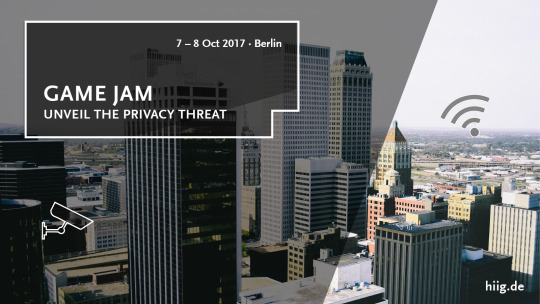
Unveil the Privacy Threat – that’s how we named the Game Jam (October 7, 2017) we’re going to host together with the Alexander von Humboldt Institute for Internet and Society – will be fun and serious. And we want you to be part of it.
We will present to you three different use cases with a direct connection to data security and privacy by design. We have invited prominent experts to talk about the importance of data privacy, advise and inspire the participants of the Game Jam. What are the use cases, who are the experts? This is use case No 3.
Use case 3: Unraveling the anonymity paradox!
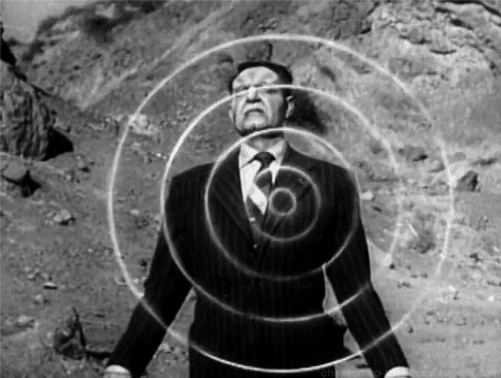
What sounds like the title of a 60′s psycho thriller B-Movie for mathematicians is in fact a modern day horror story. Here’s why.
If personal information were anonymized, all our privacy concerns would be gone! But what does “anonymized” mean?
This question is one of the hardest to resolve in the privacy debate. At present, privacy experts are grappling with the paradox that – in the big data era – there is no anonymous data anymore.
All data can always be related to an individual by means of data analysis technologies. The reason for this is that data is only considered “anonymized” if it cannot be related to an identified or even to an identifiable individual.
In order to understand this paradox, imagine this:
More than three million Berlin citizens – and another million tourists – are carrying around their personal devices every single day. There’s a Berlin-wide wifi system, which is publicly available for all people who have switched on their devices’ wifi by default. This wifi system collects the movement data of all these devices over a longer period of time.
Guess how useful this data would be for urban traffic management and many other innovations. But wouldn’t it be creepy if this data could also be misused against an individual later on?
This data is thus anonymized in order to mitigate these risks. In the process all personal identifiers (i.e. the MAC address and IMEI) of the devices captured by the wifi system – which could in principle lead to an identification of the owner or even carrier of a device – are “hashed” (i.e. substituted by a specific hash value for each identifier).
This hash value does not per se contain information referring to the owner or carrier of the device. However, it is still possible to capture the device’s movement pattern by referring to this hash. This movement pattern becomes more and more precise over time.
A person who gets access to that movement pattern (e.g. an employee of the provider of the wifi system or another data-driven company) might suddenly discover that this device must be owned by somebody he knows very well.
The reason for this is that this device “leaves” the building where he lives at the same time every morning and “moves” to an address where only lawyers work: In terms of probability, that person must be his wife!
This risk of re-identification of “anonymized” data exists generally, where it is combined with further information.
It is hard to say which information will be added and hard to say what the consequences of an identification are. It is hard to say under which conditions this risk is low enough in order to be socially acceptable.
Assignment
The goal of this use case is to develop an engaging game concept that helps people to understand the anonymity paradox. One target group are people working in companies specifically dealing with anonymized data (e.g. such as the provider of the wifi system described).
Want to join the Unveil the Privacy Threat Game Jam on October 7, 2017 in Berlin? Register here for free.
The best game idea will be awarded by an expert jury with an exciting prize – a weekend trip to London for the whole winning team including a visit of The Crystal, the world’s largest museum on the future of (smart) cities – sponsored by Siemens. Furthermore, amongst all participants, we give away two one-year-memberships of Adobe Creative Cloud sponsored by Adobe.*
*without possibility of recourse to legal action
Text by Max von Grafenstein
Game Jam – Use Case No.2: Oops… wrong recipient ?
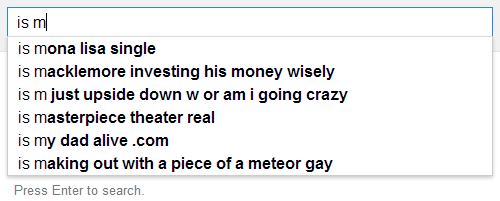
Unveil the Privacy Threat – that’s how we named the Game Jam (October 7, 2017) we’re going to host together with the Alexander von Humboldt Institute for Internet and Society. It will be fun and serious. And we want you to be part of it.
We will present to you three different use cases with a direct connection to data security and privacy by design. We have invited prominent experts to talk about the importance of data privacy, advise and inspire the participants of the Game Jam. What are the use cases, who are the experts? This is use case No 2.
Use Case 2: Oops… wrong recipient ?
The most common privacy threat in companies arises when an employee accidentally sends personal information about somebody else to the wrong recipient.
This may sound like a no-brainer, but in fact, it is one of the biggest challenges in implementing effective privacy protection policies within companies.
There are two typical constellations that give rise to slightly different challenges for companies trying to mitigate this threat:
In the first constellation, an employee uses an email client, and in the second constellation, he/she grants access to a file depository.
In both cases, an employee typically sends an email or grants access to a repository to the wrong recipient – because the email client or repository incorrectly autocompletes the address based on the first few letters.
The employee forgets to double-check the name and… oops, the information is sent to the wrong recipient.
But there are differences between the cases: They refer to how such an employee can react. If the employee has granted access to a file repository, in principle, he or she can still restrict access retrospectively.

In contrast, if the employee has sent an email, the information is definitely “gone”, and he or she can only ask the recipient not to read and/or open the content.
However, in both cases employees often do not react at all, or they do not appropriately, because they fear negative consequences if his or her colleagues or superior find out about it.
Assignment
The goal of this use case is to develop an engaging game concept that reduces the privacy threat as a result of sending personal information to the wrong recipient, in a playful manner. One target group of such a game are employees in companies dealing with personal data in general.
Want to join the Unveil the Privacy Threat Game Jam on October 7, 2017 in Berlin? Register here for free.
The best game idea will be awarded by an expert jury with an exciting prize – a weekend trip to London for the whole winning team including a visit of The Crystal, the world’s largest museum on the future of (smart) cities – sponsored by Siemens. Furthermore, amongst all participants, we give away two one-year-memberships of Adobe Creative Cloud sponsored by Adobe.*
*without possibility of recourse to legal action
Text by Max von Grafenstein
Register to win a 1-year-membership of Adobe’s Creative Cloud

Maybe you’ve heard about it: We’re hosting a Game Jam with a dedicated topic. Unveil the Privacy Threat covers data privacy and privacy by design. We’re still looking for participants. And we’re giving away a 1-year-membership for Adobe’s Creative Cloud. The whole package, including stock photos and all the useful tools for digital creatives. How?
We will draw the winner of the Adobe Creative Cloud membership among every sincere registration for the Game Jam Unveil the Privacy Threat.*
What you have to do? Simply follow THIS LINK and fill out the registration form on the website of the Alexander von Humboldt Institute for Internet and Society (HIIG).
The institute is our partner and came up with the idea of hosting this Game Jam in the first place.

Find out more about the details of the package worth more than 1000 Euros HERE.
Again we would like to thank Adobe for the uncomplicated provision of this generous price.
*without possibility of recourse to legal action
Game Jam – Use Case No.1: I’ve got nothing to hide!

Unveil the Privacy Threat – that’s how we named the Game Jam (October 7, 2017) we’re going to host together with the Alexander von Humboldt Institute for Internet and Society – will be fun and serious. And we want you to be part of it.
We will present to you three different use cases with a direct connection to data security and privacy by design. We have invited prominent experts to talk about the importance of data privacy, advise and inspire the participants of the Game Jam. What are the use cases, who are the experts? This is use case No 1.
Use Case 1: I’ve got nothing to hide!
Many people think they’ve got nothing to hide and thus do not need to protect their privacy. The reasoning behind this is that only people who have done something illegal would want to conceal their behavior. But, so the thinking goes, there’s no social need for protection for illegal behavior! Or is there?
This only relates to a tiny part of privacy protection. In fact, privacy laws doesn’t just protect those (allegedly) engaged in “illegal” behavior. Privacy also protects a person against the loss of reputation that can occur when information is disclosed and/or used in the wrong context.
As early as the 17th century, the French high priest and statesman Cardinal Richelieu stated:
“Give me a letter of six sentences written by the most honorable man, and I will find something sufficient to hang him.”

Henri Motte’s depiction of Cardinal Richelieu at the Siege of La Rochelle.
At least in Germany we don’t hang people anymore. However, what this kind of reasoning indicates is that there can always be somebody who wants to use personal information against someone. It’s this misuse of personal information that privacy seeks to protect against.
Some people even say that it actually doesn’t matter what you may have to hide; what matters is your ability to decide whether to hide something or not. This ability is guaranteed by privacy.
Privacy is hence an essential precondition for the enrollment of an autonomous personality.
Assignment
The goal of this use case is to develop an engaging game concept that challenges the “nothing-to-hide” argument in a playful manner. Ideally, such a game could be played anywhere, at any time, in a very limited period of time. Just like a quick-fire schoolyard debate.
A Wikipedia article for basic information about the Nothing to Hide argument.
An EFF guide to how to respond to the Nothing to Hide argument.
One of many useful YouTube videos about this topic.
Want to join the Unveil the Privacy Threat Game Jam on October 7, 2017 in Berlin? Register here for free.The best game idea will be awarded by an expert jury with an exciting prize – a weekend trip to London for the whole winning team including a visit of The Crystal, the world’s largest museum on the future of (smart) cities – sponsored by Siemens.
Furthermore, amongst all participants, we give away two one-year-memberships of Adobe Creative Cloud sponsored by Adobe.*
*without possibility of recourse to legal action
Text by Max von Grafenstein
Everybody is a goldmine –A Game Jam to implement privacy and security by design
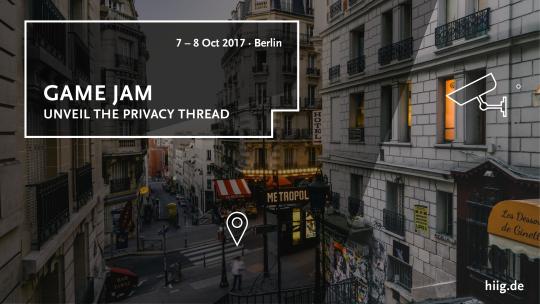
If we want tech to be more human, we’ll need to create awareness about privacy in the age of smart cities and IoT. That’s why we’re going to host a Game Jam about this subject, together with the Humboldt Institute for Internet and Society and INNOVATION & LAW. And you can apply.
Private data is the number one resource of our time. It’s what gold and oil have been in the past centuries. Our user behavior – including the tiniest subconscious decisions we make when we use smart devices and browser interfaces – is a fine but steady load that’s been mined for many years now.
To stick with this simple analogy: right now heavy machinery is invented to drill deeper. Thanks to the IoT the monitored behavior isn’t reduced to hardware we use deliberately.
The whole city will become a computer. Sensors are going to be everywhere in the smart cities of the near future. And with great data comes great responsibility.
We have to ask ourselves how we want to handle data protection and privacy in a society that seems to be dependent on progress by information.
How can we establish awareness, not only among political activists and digital rights experts but people who engineer software, plan parking lots or open networks for the public benefit?
For our partners Alexander von Humboldt Institute for Internet and Society and INNOVATION AND LAW, we’re going to host a Game Jam.
The outcome we’re hoping for? Interactive and fun approaches on why data privacy and security is something we have to think of while developing a service or product.
This awareness will have two effects: Privacy by design or privacy by default will become a standard for on the one side – and more trust in tech and progress on the other side.
GAME JAM – UNVEIL THE PRIVACY THREAD Implementing privacy and security through games
will take place on the weekend of 7-8 October at the premises of the Alexander von Humboldt Institute for Internet and Society in Berlin. There’ll be impulse talks by experts for inspiration and knowledge extension.
Right now you can apply by simply writing an email to hi@booster-space.com. Please explain in two, three sentences why you apply / how you want to contribute.


